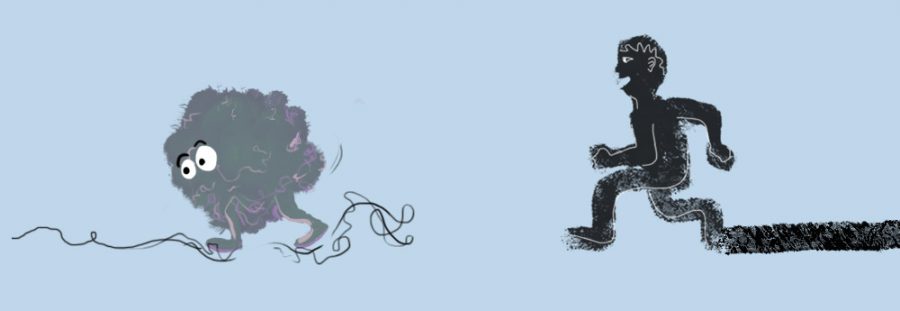Fear busters
The motivation behind actively seeking out fear
September 13, 2017
For most, the word fear evokes an immediate mental image, whether it be public speaking, failing a test or a spider inching closer. The image that comes to mind likely spurs a strong reaction: heartbeat racing, face flushing, hands trembling. And yet, despite this response, the oddity of fear is how many people actively seek out or even crave it.
From haunted houses to roller coasters, fear is the driving force behind several common forms of entertainment. Sophomore Angela Guo turns to an amusement park classic, roller coasters, as her method of seeking out fear.
Her encounters with them can be traced back to a middle school field trip to Great America, where she was wracked with nerves about riding a roller coaster for the first time. Guo’s mind spurred endless possibilities. What if the roller coaster flips over? What if I get too nauseous? Eventually, Guo managed to put those thoughts aside and rode her first roller coaster, coming to enjoy the thrill of the experience.
“I can feel the adrenaline, the excitement of going up in the sky,” Guo said. “But sometimes I get nervous. My heartbeat’s fast. How I feel—it’s more heightened.”
For Guo, the nervousness she experiences is a culmination of potential safety concerns and her preexisting fear of heights. She shares that even when on the balcony in her house, she’s afraid to look down, so her fear of heights, which is only further amplified on a roller coaster, definitely influences her experience.
“Sometimes I get this scenario in my head,” Guo said. “What if the ride malfunctions? What if one of the safety [harnesses] break? And the height. If it’s too high, I freak out and my nerves get more heightened.”
Despite the fear that roller coasters evoke in Guo, she continues to ride them. She notes that though she’s well aware of the precautions on the ride that ensure her safety, her emotions still occasionally get the best of her.
When Guo finds herself in these situations, she jumps in headfirst anyway. She looks back to her first time on a roller coaster as an example and views it as an opportunity to push herself and confront her fear head on.
“My first time on a roller coaster, I didn’t really want to be scared because it’s a fun activity, not like a life or death situation,” Guo said. “Afterwards, I [felt] like I accomplished my fear of heights. I’ll go back to the roller coaster, even though it’s sometimes scary, since I can get more experience and have more time to explore my limits.”
Big Screen, Big Scare
While Guo prefers roller coasters, sophomore Elena Chen looks to horror movies instead as her method of seeking out fear.
“I like being scared, actually,” Chen said. “Even though I get scared really easily, I just like watching it with friends and [experiencing] the horror together.”
Art teacher Jay Shelton, who also turns to horror movies for entertainment, expresses a sentiment different than that of Chen’s and Guo’s. For him, the enjoyment of horror movies extends past the immediate thrill.
While he does sometimes enjoy jumpscares that elicit an initial thrill, listing “Jaws” as an example, he also notes that jumpscares only work when seeing the movie in theater. In many case, Shelton views movies that rely heavily on jumpscares to be lazy, as he sees no art in them past the in-the-moment thrill. Instead, he prefers movies, like “Rosemary’s Baby,” “The Sixth Sense” and “The Exorcist,” that aim beyond this.
“What I like is a horror movie that puts ideas in my head that are very uncomfortable or visuals that you can never get rid of,” Shelton said. “Some people just like the thrill. It’s like a rollercoaster to some people. To me, it’s more psychological. It’s the ideas.”
While Shelton values a horror movie’s ability to evoke his emotions, Chen watches them for different reasons. Besides enjoying the thrill aspect of horror movies, they also serve as a form of stress relief for her. Chen likened the experience of watching a horror movie to screaming, both of which allow her to let her stress out into another activity.
Although she now views them in a positive light, Chen was initially wary about the idea of watching a horror movie. However, after being tricked by a friend into watching her first horror movie, Chen’s opinion changed completely.
“It was really surprising to see what [horror movies] are actually like,” Chen said. “When I saw all the really gory details, it was like ‘Whoa, this is pretty interesting.’ It drew me in, and after that first initial encounter, I just kept going back every night.”
The immersive aspect of horror movies is something that also appeals to Shelton. To him, his enjoyment of the horror movie isn’t defined by its budget or even necessarily its actors.
Though horror movies have a psychological effect on Shelton, they impact his emotions as well, which is ultimately reflected in his physical reactions.
“My reaction is I’d go into those movies, and I’d be nervous from the beginning,” Shelton said. “When I saw ‘Jaws’ and that scene where the head pops on the boat—I screamed so loud that for the rest of the movie, I was watching it half covering my eyes.”
The fear that this scene provoked stayed with Shelton for the rest of the film. He spent the remainder of the movie waiting in anticipation for another jumpscare and wondering what would happen next.
However, this type of reaction when watching a horror movie isn’t something unique to him. For Chen, this reaction also comes along naturally in the face of fear.
“[I’m] very tense and constantly expecting something to suddenly pop out,” Chen said. “You’re on the edge of your chair. It’s pretty scary because [my friends and I] always watch them at the night time, so the environment itself creeps you out.”
Regardless of the reactions that fear elicits, the human desire to feel and crave emotion is what drives Shelton to keep seeking it out.
“Everybody wants to feel emotions when they see a movie, whether it’s sad or horror or laughing or excitement,” Shelton said. “If anything can make you feel that afraid, isn’t that worth checking out?”


















